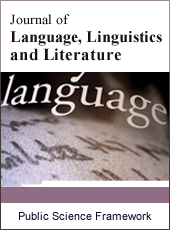Journal of Language, Linguistics and Literature
Articles Information
Journal of Language, Linguistics and Literature, Vol.4, No.4, Dec. 2018, Pub. Date: Oct. 25, 2018
Three International Genre Schools in EAP Research
Pages: 45-54 Views: 2288 Downloads: 1609
[01]
Lu Huang, School of Foreign Languages and Cultures, Nanjing Normal University, Nanjing, China.
[02]
Liping Chen, School of Foreign Languages and Cultures, Nanjing Normal University, Nanjing, China.
This paper reviewed three international genre schools in the area od EAP (English for Academic Purposes) research. They are the so-called British tradition of ESP (English for Specific Purposes) / EAP, the American New Rhetoric (NR) or Sociorhetoric and the Sydney Systemic Functional Linguistics (SFL) school. The similarities and differences among the three schools are also compared and generalized. However, although big differences exist among the three schools, the hybrid model is one of the trend in genre study. For example, the deny of effectiveness on explicit instruction in NR has been changed, ethnographically based analyses and discourse-oriented ethnographies became more popular as the decade progressed in ESP and JEAP journals and ESP scholars like Ken Hyland, based on the notions of stance and engagement in interpersonal function of SFL, invented the new notion of hedges and boosters in ESP school. Thus, the boundaries and rules among the leading three schools in genre study are not absolutely clear and it is the trend in genre study to make the best of each school.
Genre, English for Specific Purposes, Systemic Functional Linguistics, New Rhetorical
[01]
Bazerman, C. 1988. Shaping Written Knowledge: The Genre and Activity of the Experimental Article in Science [M]. Madison: Univerisity of Wisconsin Press.
[02]
Bazerman C. 2003. Textual Performance: Where the Action at a Distance Is [J]. JAC, 23 (2): 379-396.
[03]
Beaufort, A. and J. A. Williams, 2005. Writing history: Informed or not by genre theory? In: A. Herrington and C. Moran (Eds), Genre across the curriculum: 44-64. Logan, Utah: Utah State University Press.
[04]
Belcher, D. D. 2004. Trends in Teaching English for Specific Purposes. Annual Review of Applied Linguistics [J], 24: 165-86.
[05]
Berkenkotter, C. & Huckin, T. 1993. Rethinking genre from a sociocognitive perspective [J]. Written Communication 10 (4): 475-509.
[06]
Bhatia, V. K. 1993. Analysing Genre: Language Use in Professional Settings [M]. London: Longman.
[07]
Biber, D., Connor, U., & Upton, T. A. 2007. Discourse on the move: Using corpus analysis to describe discourse structure (Vol. 28) John Benjamins Publishing. British Council, n. d. Methodology Recounts. Retrieved from https://learnenglish.britishcouncil.org/en/writing-purpose/methodology-recounts
[08]
Bialostosky, D. 1994. From discourse in life to discourse in art: Teaching poems as Bakhtinian speech genres. In Freedman, A. & Medway, P. (Eds.), Teaching and Learning Genre: 105-114. Portsmouth, NH: Boynton/Cook.
[09]
Christie, F. 1991. Genres as social processes. In Working with Genre: Papers from the 1989 LERN Conference: 73–88. Leichhardt, Australia: Common Ground.
[10]
Christie, F., & Maton, K. 2011. Disciplinarity: Functional linguistic and sociological perspectives [M]. London: Continuum.
[11]
Coe, R. 1994b. Teaching genre as process. In Freedman, A. & Medway, P. (Eds), Learning and Teaching Genre: 157-169. Portsmouth, NH: Boynton/ Cook.
[12]
Coffin, C. 2010. Incorporating and Evaluating Voices in a Film Studies Thesis. Writing and Pedagogy [J], 1 (2): 163–193.
[13]
Gollin-Kies, S. 2014. Methods reported in ESP research articles: A comparative survey of two leading journals [J], English for Specific Purposes, (36): 27-34.
[14]
Halliday, M. A. K. 1978. Language as social semiotic: The social interpretation of language and meaning [M]. London: Edward Arnold.
[15]
Halliday, M. A. K. 1987. Spoken and Written Modes of Meaning [M]. London: Academic Press.
[16]
Hewings, A. 2004. Developing discipline specific writing: An analysis of undergraduate geography essays. In L. Ravelli & R. Ellis (Eds.), Analysing academic writing: Contextualized frameworks: 131–152. London: Continuum.
[17]
Hood, S. 2010. Appraising research: Evaluation in academic writing [M]. London: Palgrave Macmillan.
[18]
Hyland, K. 2004. Genre and second language writing [M]. Michigan: University of Michigan Press.
[19]
Hyland, K. 2008. Metadiscourse [M]. Beijing: Foreign Language Teaching and Research Press.
[20]
Johns, A. M. 2002. Destabilizing and Enriching Novice Students’ Genre. In Johns, A. M. (Ed.), Theories. Genre in the Classroom: Multiple Perspectives: 237-248. Mahwah, NJ: Lawrence Erlbaum.
[21]
Johns, A. M. 2003. Genre and ESL/EFL Composition Instruction. In Barbara Kroll, B (Ed), Exploring the Dynamics of Second Language Writing. Cambridge: Cambridge University Press: 195-217.
[22]
Lee, S. H. 2010. Command strategies for balancing respect and authority in undergraduate expository essays [J]. Journal of English for Academic Purposes, 9: 61–75.
[23]
Macken-Horarik, M. 2002. Something to shoot for: A systemic functional approach to teaching genre in secondary school science. In A. Johns (Ed.), Genre in the classroom: Multiple perspectives: 17–42. New Jersey: Lawrence Erlbaum.
[24]
Martin, J. R. 1993b. Genre and literacy—Modeling context in educational linguistics [J]. Annual Review of Applied Linguistics [J], 13: 141–172.
[25]
Martin, J. R. & Rose, D. 2008. Genre Relations: Mapping Culture [M]. London: Equinox.
[26]
Miler, C. 1984. Genre as social action. Quarterly Journal of Speech [J], 70: 151-167.
[27]
Motta-Roth, D. 2009. The Role of Context in Academic Text Production and Writing Pedagogy. In Bazerman, C., Bonini, A., & Figueiredo (Eds), Genre in a Changing World: 317-336. Fort Collins: The WAC Clearinghouse Press.
[28]
Swales, J. M. 1990a. Genre Analysis: English in Academic and Research Settings [M]. Cambridge: Cambridge University Press.
[29]
Thompson, G. 2001. Interaction in academic writing: learning to argue with the reader. Applied Linguistics [J], 22 (1), 58–78.

ISSN Print: 2381-7054
ISSN Online: 2381-7062
Current Issue:
Vol. 6, Issue 1, March Submit a Manuscript Join Editorial Board Join Reviewer Team
ISSN Online: 2381-7062
Current Issue:
Vol. 6, Issue 1, March Submit a Manuscript Join Editorial Board Join Reviewer Team
| About This Journal |
| All Issues |
| Open Access |
| Indexing |
| Payment Information |
| Author Guidelines |
| Review Process |
| Publication Ethics |
| Editorial Board |
| Peer Reviewers |


